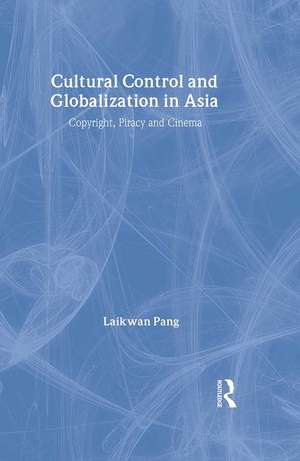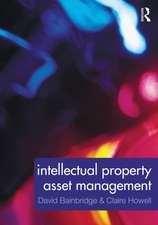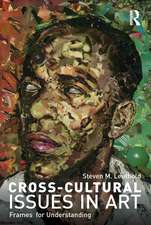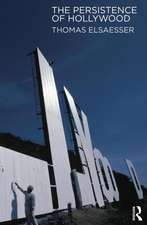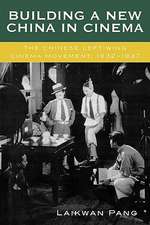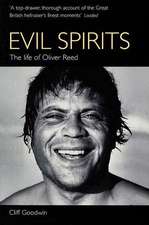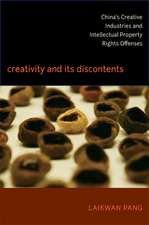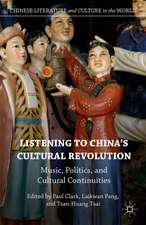Cultural Control and Globalization in Asia: Copyright, Piracy and Cinema: Media, Culture and Social Change in Asia
Autor Laikwan Pangen Limba Engleză Hardback – 15 dec 2005
Focusing on the cinema of China, Taiwan and Hong Kong, and film 'piracy' in these countries, the book argues that ideas of cultural ownership and copyright are not as clear-cut as they may at first seem, and that copyright is used as a means through which cultural control is exercised by the cultural big business of the dominant power.
| Toate formatele și edițiile | Preț | Express |
|---|---|---|
| Paperback (1) | 479.63 lei 6-8 săpt. | |
| Taylor & Francis – 17 oct 2006 | 479.63 lei 6-8 săpt. | |
| Hardback (1) | 1270.19 lei 6-8 săpt. | |
| Taylor & Francis – 15 dec 2005 | 1270.19 lei 6-8 săpt. |
Din seria Media, Culture and Social Change in Asia
-
 Preț: 378.83 lei
Preț: 378.83 lei -
 Preț: 329.94 lei
Preț: 329.94 lei -
 Preț: 297.40 lei
Preț: 297.40 lei -
 Preț: 364.22 lei
Preț: 364.22 lei - 18%
 Preț: 1276.52 lei
Preț: 1276.52 lei - 28%
 Preț: 820.73 lei
Preț: 820.73 lei -
 Preț: 367.83 lei
Preț: 367.83 lei - 18%
 Preț: 1272.58 lei
Preț: 1272.58 lei - 18%
 Preț: 1220.31 lei
Preț: 1220.31 lei -
 Preț: 487.47 lei
Preț: 487.47 lei - 18%
 Preț: 1162.84 lei
Preț: 1162.84 lei -
 Preț: 383.63 lei
Preț: 383.63 lei - 18%
 Preț: 1167.71 lei
Preț: 1167.71 lei -
 Preț: 415.24 lei
Preț: 415.24 lei - 18%
 Preț: 703.45 lei
Preț: 703.45 lei - 26%
 Preț: 874.74 lei
Preț: 874.74 lei - 18%
 Preț: 1054.27 lei
Preț: 1054.27 lei -
 Preț: 459.71 lei
Preț: 459.71 lei - 18%
 Preț: 1003.43 lei
Preț: 1003.43 lei - 11%
 Preț: 323.91 lei
Preț: 323.91 lei -
 Preț: 383.63 lei
Preț: 383.63 lei - 15%
 Preț: 426.77 lei
Preț: 426.77 lei - 18%
 Preț: 1059.84 lei
Preț: 1059.84 lei - 18%
 Preț: 1058.43 lei
Preț: 1058.43 lei -
 Preț: 412.19 lei
Preț: 412.19 lei - 18%
 Preț: 1057.75 lei
Preț: 1057.75 lei - 18%
 Preț: 1164.92 lei
Preț: 1164.92 lei - 18%
 Preț: 1219.72 lei
Preț: 1219.72 lei - 18%
 Preț: 1054.75 lei
Preț: 1054.75 lei - 18%
 Preț: 1108.73 lei
Preț: 1108.73 lei -
 Preț: 402.13 lei
Preț: 402.13 lei - 18%
 Preț: 1219.72 lei
Preț: 1219.72 lei -
 Preț: 408.74 lei
Preț: 408.74 lei - 18%
 Preț: 1216.52 lei
Preț: 1216.52 lei - 26%
 Preț: 846.09 lei
Preț: 846.09 lei - 18%
 Preț: 1219.65 lei
Preț: 1219.65 lei -
 Preț: 409.69 lei
Preț: 409.69 lei - 18%
 Preț: 1166.17 lei
Preț: 1166.17 lei
Preț: 1270.19 lei
Preț vechi: 1549.00 lei
-18% Nou
Puncte Express: 1905
Preț estimativ în valută:
243.08€ • 263.95$ • 204.19£
243.08€ • 263.95$ • 204.19£
Carte tipărită la comandă
Livrare economică 22 aprilie-06 mai
Preluare comenzi: 021 569.72.76
Specificații
ISBN-13: 9780415352017
ISBN-10: 0415352010
Pagini: 160
Dimensiuni: 156 x 234 mm
Greutate: 0.39 kg
Ediția:New.
Editura: Taylor & Francis
Colecția Routledge
Seria Media, Culture and Social Change in Asia
Locul publicării:Oxford, United Kingdom
ISBN-10: 0415352010
Pagini: 160
Dimensiuni: 156 x 234 mm
Greutate: 0.39 kg
Ediția:New.
Editura: Taylor & Francis
Colecția Routledge
Seria Media, Culture and Social Change in Asia
Locul publicării:Oxford, United Kingdom
Public țintă
Postgraduate and UndergraduateCuprins
1. Introduction 2. Expressions, Originality and Fixation 3. Copyright’s Limits and Ethics 4. Violence and New Asian Cinema 5. Copying Kill Bill 6. Movie Piracy as a Technological Threat to Hollywood 7. The Despair of Chinese Cinema
Notă biografică
Laikwan Pang is Assistant Professor at the Department of Modern Languages and Intercultural Studies, Chinese University of Hong Kong.
Recenzii
'When does inspired creativity become plagiarism? What is the difference between video piracy and free trade? Globalisation has made these hot button issues today, and Pang Laikwan's Cultural Control and Globalisation in Asia shows us why. Her analyses of, for example, stylized violence in the production of an Asian cinematic identity and Kill Bill's copying of it versus attempts to control copying of DVDs of Kill Bill, are vivid and vital reading for anyone who wants to understand the forces shaping contemporary Asian cinematic culture.'
- Chris Berry, Professor of Film and Television Studies, Goldsmiths College, University of London, UK
'This book makes a valuable contribution to discussions of global film culture. Through an original exploration of the role of "copying" in Asian (and American) cinema, Pang offers us new ways to think about issues ranging from copyright to the relations between global and local cinematic production. And through an equally originally discussion of "violence" in cinema, Pang opens up a new perspective on the problem of the relations between images and practices of violence. It will be a welcome addition to those trying to "globalize" the study of media.'
- Lawrence Grossberg Morris Davis Distinguished Professor of Communication Studies and Cultural Studies, University of North Carolina, USA
Pang maintains a radical perspective in her hopes of producing a book that will‘help us envision a culture with a higher degree of autonomy and resistance against hegemonic control’ (p. 13). Towards this end, she makes a complex, critical, and thoroughly interesting argument in this lucid piece of interdisciplinary scholarship that should appeal to legal scholars as much as to scholars of cinema and cultural studies. In spite of its theoretical eclecticism*or perhaps because of it*the book manages to present a cogent and often very concrete account of the complexities, and sometimes ambivalences, of contemporary Asian cinema within the context of capitalism, political control, and globalization. - Asian Journal of Communication
Pang maintains a radical perspective in her hopes of producing a book that will‘help us envision a culture with a higher degree of autonomy and resistance against hegemonic control’ (p. 13). Towards this end, she makes a complex, critical, and thoroughly interesting argument in this lucid piece of interdisciplinary scholarship that should appeal to legal scholars as much as to scholars of cinema and cultural studies. In spite of its theoretical eclecticism*or perhaps because of it*the book manages to present a cogent and often very concrete account of the complexities, and sometimes ambivalences, of contemporary Asian cinema within the context of capitalism, political control, and globalization. - Asian Journal of Communication
'When does inspired creativity become plagiarism? What is the difference between video piracy and free trade? Globalisation has made these hot button issues today, and Pang Laikwan's Cultural Control and Globalisation in Asia shows us why. Her analyses of, for example, stylized violence in the production of an Asian cinematic identity and Kill Bill's copying of it versus attempts to control copying of DVDs of Kill Bill, are vivid and vital reading for anyone who wants to understand the forces shaping contemporary Asian cinematic culture.'
- Chris Berry, Professor of Film and Television Studies, Goldsmiths College, University of London, UK
'This book makes a valuable contribution to discussions of global film culture. Through an original exploration of the role of "copying" in Asian (and American) cinema, Pang offers us new ways to think about issues ranging from copyright to the relations between global and local cinematic production. And through an equally originally discussion of "violence" in cinema, Pang opens up a new perspective on the problem of the relations between images and practices of violence. It will be a welcome addition to those trying to "globalize" the study of media.'
- Lawrence Grossberg Morris Davis Distinguished Professor of Communication Studies and Cultural Studies, University of North Carolina, USA
- Chris Berry, Professor of Film and Television Studies, Goldsmiths College, University of London, UK
'This book makes a valuable contribution to discussions of global film culture. Through an original exploration of the role of "copying" in Asian (and American) cinema, Pang offers us new ways to think about issues ranging from copyright to the relations between global and local cinematic production. And through an equally originally discussion of "violence" in cinema, Pang opens up a new perspective on the problem of the relations between images and practices of violence. It will be a welcome addition to those trying to "globalize" the study of media.'
- Lawrence Grossberg Morris Davis Distinguished Professor of Communication Studies and Cultural Studies, University of North Carolina, USA
Pang maintains a radical perspective in her hopes of producing a book that will‘help us envision a culture with a higher degree of autonomy and resistance against hegemonic control’ (p. 13). Towards this end, she makes a complex, critical, and thoroughly interesting argument in this lucid piece of interdisciplinary scholarship that should appeal to legal scholars as much as to scholars of cinema and cultural studies. In spite of its theoretical eclecticism*or perhaps because of it*the book manages to present a cogent and often very concrete account of the complexities, and sometimes ambivalences, of contemporary Asian cinema within the context of capitalism, political control, and globalization. - Asian Journal of Communication
Pang maintains a radical perspective in her hopes of producing a book that will‘help us envision a culture with a higher degree of autonomy and resistance against hegemonic control’ (p. 13). Towards this end, she makes a complex, critical, and thoroughly interesting argument in this lucid piece of interdisciplinary scholarship that should appeal to legal scholars as much as to scholars of cinema and cultural studies. In spite of its theoretical eclecticism*or perhaps because of it*the book manages to present a cogent and often very concrete account of the complexities, and sometimes ambivalences, of contemporary Asian cinema within the context of capitalism, political control, and globalization. - Asian Journal of Communication
'When does inspired creativity become plagiarism? What is the difference between video piracy and free trade? Globalisation has made these hot button issues today, and Pang Laikwan's Cultural Control and Globalisation in Asia shows us why. Her analyses of, for example, stylized violence in the production of an Asian cinematic identity and Kill Bill's copying of it versus attempts to control copying of DVDs of Kill Bill, are vivid and vital reading for anyone who wants to understand the forces shaping contemporary Asian cinematic culture.'
- Chris Berry, Professor of Film and Television Studies, Goldsmiths College, University of London, UK
'This book makes a valuable contribution to discussions of global film culture. Through an original exploration of the role of "copying" in Asian (and American) cinema, Pang offers us new ways to think about issues ranging from copyright to the relations between global and local cinematic production. And through an equally originally discussion of "violence" in cinema, Pang opens up a new perspective on the problem of the relations between images and practices of violence. It will be a welcome addition to those trying to "globalize" the study of media.'
- Lawrence Grossberg Morris Davis Distinguished Professor of Communication Studies and Cultural Studies, University of North Carolina, USA
Descriere
This book challenges the prevailing view of cinema and cinema culture, that Hollywood/the US creates, produces and exports, with other countries importing, sometimes modifying and sometimes pirating 'original' American work.
